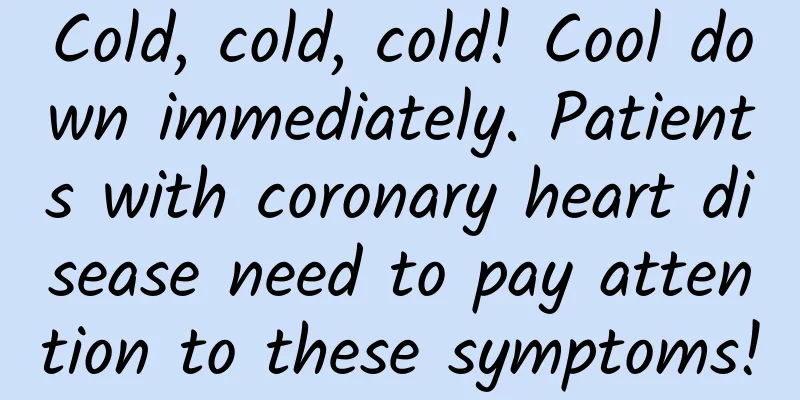Cold, cold, cold! Cool down immediately. Patients with coronary heart disease need to pay attention to these symptoms!

|
Although it is old, the number of patients with cardiovascular medicine has not decreased. This is because cold air stimulates blood vessels to constrict, increase blood pressure, and accelerate heart rate, which increases the burden on the heart and causes myocardial hypoxia, inducing angina pectoris, and even myocardial infarction. The upcoming cold wave will bring severe challenges to the health of patients with coronary heart disease. When the following abnormal signals appear in the body, you should be highly vigilant and seek medical attention in time! Part 1 "When the following symptoms appear in your body, be alert" 1. The cause of angina pectoris is not obvious Angina pectoris usually only occurs when there is an obvious cause, but it can also occur during rest or at night. 2. Angina symptoms are getting worse Angina symptoms gradually worsen, or chest tightness and palpitations occur more frequently, become more severe, expand in range, and last longer than before. 3. Symptoms are not significantly relieved after taking the medicine When angina pectoris attacks, sublingual nitroglycerin, Quick-acting Heart-saving Pills, or Musk Heart-protecting Pills will not effectively relieve the symptoms within 10 minutes. 4. Other symptoms during the attack The symptoms are also accompanied by dizziness, profuse sweating, vomiting, nausea, etc. 5. Sudden chest tightness and panic Suddenly, symptoms such as chest tightness, fatigue, and palpitations that had never occurred before appeared, and they tended to gradually worsen. 6. Pain in other parts of the body related to fatigue The phenomenon of body pain is related to fatigue, excitement, etc., and may cause headaches, upper abdominal pain, toothache, mandibular pain, left shoulder and arm pain, back pain, etc., which should also be taken seriously. So, how can patients with coronary heart disease spend the winter safely? An expert from the Department of Cardiology at Pingjiang County First People's Hospital reminds everyone to pay attention to the following points: Part 2 "Cardiovascular physicians remind everyone" 1. Keep warm Wear masks, hats and cotton clothes when doing outdoor activities to keep your face and limbs warm. When the temperature is low, try to reduce the time spent outdoors. Once you catch a cold, combined with respiratory infections, it will make coronary heart disease patients even worse. Keep the temperature indoors comfortable and open windows regularly for ventilation. 2. Ensure adequate exercise Before exercising, you should be prepared to keep warm and warm up for about 5 minutes to fully relax your muscles and prepare your cardiovascular system for the upcoming exercise. Pay attention to choosing soothing sports such as walking, jogging, Tai Chi, etc. The intensity of exercise should be gradually increased so that you do not feel tired. The appropriate exercise heart rate = 170-age. Patients with frequent angina symptoms should not exercise. 3. Pay attention to a balanced diet Eat more vegetables and fruits to keep bowel movements smooth; try to eat foods that are low in crude fiber, fat, high in protein, less greasy, rich in vitamins and easily digestible; eat less offal, egg yolks and other foods with high cholesterol content, and meat should be fish and skinless poultry; don't eat too much, as overeating can easily induce angina pectoris, etc. 4. Take medication regularly Patients with coronary heart disease should adhere to long-term regular medication and are strictly prohibited from stopping or changing medications on their own. If there are special circumstances, they should consult a professional cardiovascular physician for adjustments and follow the doctor's orders for regular check-ups. 5. Maintain a positive attitude Ensure adequate sleep, avoid smoking and drinking, do not stay up late, and avoid negative emotions. Negative states can easily lead to excessive consumption of the body in a short period of time, thereby causing acute ischemic events of coronary heart disease. Keep a happy mood and avoid large fluctuations in emotions.
(Edited by Wx) |
>>: How to deal with autoimmune diseases, such as atopic dermatitis?
Recommend
Why do I cry before my period?
During menstruation, due to the influence of horm...
What should I do if my period doesn't come when I wear an IUD?
We all know that IUD is a long-term and effective...
Can intestinal flora be inherited? New study: Poor development of offspring may be caused by the man's intestinal flora disorder
For modern workers, the intestines may be the mos...
What are the early symptoms of cervical lesions?
Cervical lesions usually refer to cervical cancer...
Can I still run if I have a lumbar disc herniation?
A few days ago, someone asked, "Can I still ...
How to prevent cesarean section scar hyperplasia
We all know that cesarean section is very harmful...
How long does it take to recover from a cesarean section?
Caesarean section and natural birth are both ways...
Can I drink soy milk during menstruation? It turns out that this is the case
As we all know, women's menstrual period is a...
What is the reason for less menstrual flow in the forties?
The amount of menstruation should not be too much...
Are you afraid of catching a cold due to gynecological inflammation?
Many women will have some gynecological inflammat...
Will having a fat belly make you stupid? Do these 6 things to effectively reduce belly fat!
Author: Xue Qingxin, registered dietitian Reviewe...
What is the fiber content of common foods? Which fruits contain the most fiber?
Cellulose is the most widely distributed and abun...
Can I massage my head during my period?
I believe that most female friends are the most e...
BatteryBox: Survey shows Chrome is the killer of MacBook battery life
Google's Chrome browser has a lot of fans, bu...









